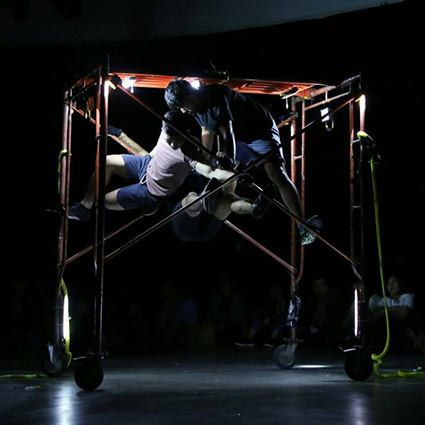Starting with the premise that the body is the constitution then reprocessing the “material” both in training and in working on bodily material, which is rearranged into scene material so that later it can be integrated into the performances. Is it possible to apply the choreography method in the material work system and simultaneously that two things can be transferred to the realm of choreographic works? How can the construction of these hard materials build the structure in an incursive choreography work? How was the material gathered during the research ‘translated’ and how far did the transfer break down boundaries? In my opinion, the issue of materiality does not only talk about objectivity but can reveal other things through physical relations and also spatial relationships. Space can influence events and can also give meaning. In my work, this research not only talks about the relationship between body and material, but also about the relationship between body and space (spatial) with distance and temporality. Temporality works in a chaotic framework. The character of chaos in the context of tradition is part of the daily choreography of society and part of the rules that take place, while chaos that occurs in urban areas is a contestation of the capital. The traumatic body is the embodiment of the physical incursive events that I have seen and lived in both in my origin and in urban areas where I live now. How does the body recognize the powers in space? What meaning is opened from the bodily actions that occur? This research is no longer talking about cities or talking about traditions, but about the abstraction. How physical events or visual events are elevated to the conceptual level to identify spatial and material characteristics at specific times and places as “new bodily” events.
BIO: MFA Graduate from the Jakarta Institute of the Arts, Densiel Prisma Yanti Lebang has been actively working as an independent artist, director, choreographer and performer since 2013. She is has worked for contemporary Indonesian and international artists such as Sardhono W Kusumo, Afrizal Malna, Melati Suryodarmo, Hanafi, Andara F. Moeis, Hartati, Judith Sanchez Ruiz from USA, Ismaera and Quick (MuDa) from Japan. Since 2015 she has been involved in many workshops facilitated by local and international practitioners such as Arno (Netherlands), Wardi (Malaysia), Anouk Peeters (Belgium), Ingun Bjornsgaard (Norway), Antony Hamilton (Australia), Su-Wen Chi (Taiwan), Arco Renz (Belgium), Suprapto Suryodarmo (Solo), and Benny Krisnawardi (Jakarta). In 2018, she also had the opportunity to join the Shifting Workshop at Play Practice Residency in India with Robert M. Heyden from Ultima Vez Company. Her works include, No Limit (2016), EMOLOGUE (2016), Dejavu: Choreojam IKJ with the Kwek-Kwek Trio (2016), MyWay (2016), 1 (2015), Myspace (2015), Meonglikan Ahihihi (2016) 2014), AMEN (2014). In 2017, she received a grant from the Kelola Foundation to create #NEEDMOREINTERACTION and was chosen as a choreographer for the work of “Ins and Outs” Sasikirana Dance Lab and ChoreoLab Bandung. In 2018, she created the work “Let’s Talk” in the “Cross Media” program organized by the Jakarta Arts Council. In the same year she presented her work entitled “Inhibition” at the Salihara International Performing Arts Festival and at the PostFest held by the Postgraduate Jakarta Institute of the Arts, at the end of 2018 she presented her work entitled “No Limit 2.0” at the Indonesian Dance Festival. In 2019, she presented “Inhibition 2.0” at the Ansan Street Arts Festival in South Korea and at the Cabaret Chairil Theater Garasi, and made a new work entitled “MISS” at Asiatri Jogjakarta. In 2020 She present her new work “Bodily/Physical/Material” at Sanskar Festival India and “CHAOTIC” at Dance in Asia Taiwan. Currently, she work as program manager at Standarmime Foundation.


